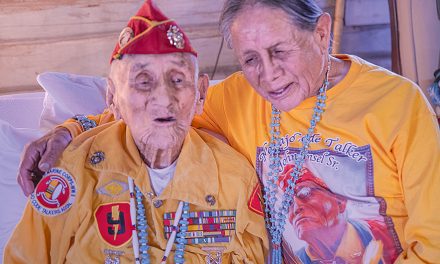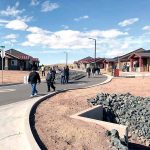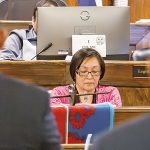
Are laws being changed to benefit Navajo Gaming?

WINDOW ROCK
Since Attorney General Ethel Branch put a halt to the Twin Arrows Travel Center project over a year ago, the Navajo Nation Council has amended the Navajo Nation Code to prevent this from happening again.
Not only does the amended law prevent the attorney general from having the final say, it also greatly benefits Navajo Gaming Enterprise.
This advantage was identified by Delegate Amber Crotty as she became the lone lawmaker to vote red (no) on the bill during Council’s winter session. During the 2017 summer session she was one of three delegates who voted red on another resolution beneficial to gaming (CJ4-49-17).
“I don’t know how gaming lobbies,” said Crotty when the legislation came up last month. “This looks like the second legislation that this Council changes major laws for the benefit for Navajo gaming.
“When I talk to my chapters and my community, not only are they concerned with the focus being on gaming but how this money is being planned to be used,” she said.
In the end both bills were approved and both times Navajo Gaming Enterprise officials applauded, which is odd since nowhere in either bill’s language do they specifically mention NGE.
Bill 0447-17 amends the laws governing the Sihasin Fund. The S’hasin Fund was established after the tribe received a $554 million settlement. In December 2014, Council passed a bill establishing the fund and in April 2015, the Naa’bik’’y‡ti’ Committee established the S’hasin subcommittee to review and evaluate recommendations from individuals, chapters, tribal entities, programs and officials for utilizing the money.
Among the allowed uses for the money is infrastructure to support economic development.
In July 2016 the Council approved the Twin Arrows Travel Center Development plan to build a convenience store, gas station, and trucker service station at the Interstate 40 interchange near the casino. The president signed off on the final resolution.
However, the funding has yet to be released due to the opinions issued by the attorney general, which imply that the travel center is not within the definition of “economic development.”
In the latest bill, Council looked to clarify the definition of “economic development.” The new language includes financing for economic development “including infrastructure as, but not limited to, commercial and government buildings, waterlines, solid waste management development, and powerline projects, and transportation and communication systems.”
In other words, the travel center.
Along with these changes it also amended how Council can leverage the Sihasin Fund for projects by guaranteeing loans, matching funding, direct funding in part, and even loan financing.
“The Nation has an overwhelming amount of needs. What I saw is everything costs money and I began to advocate that the Nation needs to create $250 to $500 million more a year to address the needs we have,” said Dwight Witherspoon, Budget and Finance Committee vice chair and sponsor of the bill.
“How do you create more money?” he asked. “You have to look at revenue sources and business is one of those.”
Witherspoon denied the contention that the law was changed to favor the travel center.
“This change is not for gaming only,” said Witherspoon. “It’s to fund projects all across the nation, it’s the purpose.”
Added Budget and Finance Committee member Leonard Tsosie, “I never understood the opinion of the attorney general or Department of Justice. When you read the original language it is broad enough to cover economic development and community development.”
Tsosie made no bones about the travel center being the impetus for the bill.
“What started this is the travel center for gaming,” he said. “It was to make money.”
Crotty’s main concern was that no plans for projects in the Northern and Fort Defiance agencies were listed for funding from the Sihasin Fund.
“We go back to the argument that economic development will provide revenue for us as a government to spend,” said Crotty. “But this Council has been in existence for almost a hundred years and our people are still suffering out there. Sometimes I can’t believe we have a president and speaker from Northern agency and we are not seeing real benefit.”
Although Crotty’s words were heard the real problem for the delegates was that the Twin Arrows project had fallen to the wayside, and it became normal to change laws to fix it.
Case in point: During the summer session Resolution CJ4-49-17 was approved and enacted into law after Begaye did not take any action within his 10-day review period.
The resolution amended two items in Title 12 of the Navajo Nation Code: the General Obligation Bond and Revenue Bonds. The amendment eliminates the requirement for both the controller’s and the attorney general’s approval before bonds can be issued.
While this bill also did not mention gaming, it paves the way for the Council to set aside Sihasin money for the travel center without any interference by Branch.
The timing definitely makes it look like a reaction to Branch’s derailing of the travel center project.
Branch issued a memo stating her worry about the bill at the time.
“Passing this legislation will remove the important legal and political protections that the Attorney General and the Controller’s approvals provide to our leadership,” stated Branch in her memo.
“It’s greatly concerning because the Attorney General’s approval of Nation-to-Nation loans and transactions serves as confirmation that those loans are in compliance with the Nation’s laws and policies.”
Branch said the change will allow leaders to approve transactions without careful thought when it comes to spending the Nation’s public funds.
“DinŽ Fundamental Law imposes upon our leaders a Ôfiduciary responsibility to the Navajo people to execute the trust the people have placed with them in the administration of the government,'” stated Branch. “The Navajo people will no longer have the assurance and comfort that their public funds are being properly invested and expanded.”
But delegates have said that eliminating the attorney general and controller shouldn’t sound any alarms because they are still much a part of the review process.
“All we were doing is trying to use the fund for development,” said Tsosie.
Navajo Gaming Enterprise did not respond to questions from Navajo Times.
To read the full article, pick up your copy of the Navajo Times at your nearest newsstand Thursday mornings!
Are you a digital subscriber? Read the most recent three weeks of stories by logging in to your online account.








 Highway 264,
Highway 264, I-40, WB @ Winslow
I-40, WB @ Winslow